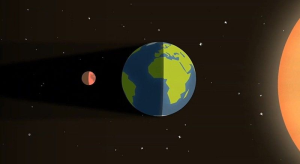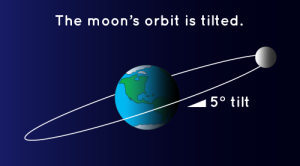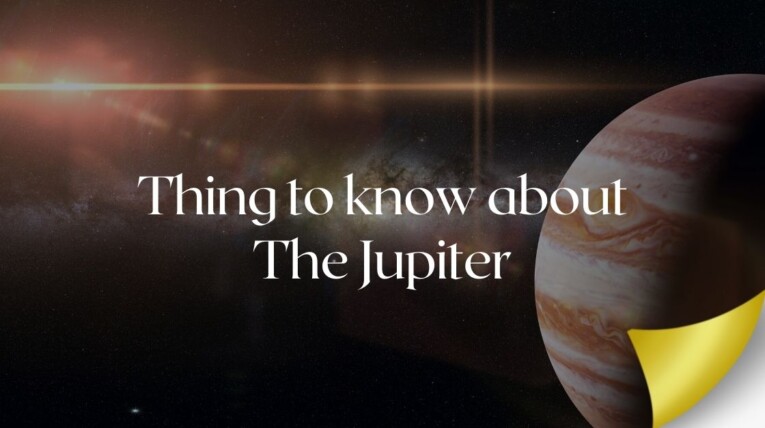Hello, stargazers!
The universe is here to bring you another mesmerizing celestial event, the September 2025 lunar eclipse! Did you miss the chance to watch the total lunar eclipse in March? Don’t worry, here is another chance to witness the blood moon again. So before the moon turns red again this year, let’s discover fascinating details about the September 2025 total lunar eclipse.
Why Do Lunar Eclipses Occur?
Before we get too excited about watching the September 2025 lunar eclipse, let’s learn about the science behind it.

credits: NASA’s Scientific Visualization Studio
The September 2025 total lunar eclipse is just like that one friend who never misses a chance to photobomb your pictures; Earth occasionally does the same to the Moon! Imagine this: the Sun, Earth, and Moon align in such a way that Earth positions itself right between the Sun and the Moon, casting its shadow on our Moon. This cosmic alignment creates what we call a lunar eclipse, a fascinating phenomenon where the Moon momentarily dims as it passes through Earth’s shadow.
Why Don’t We Experience a Lunar Eclipse Every Month?
Have you ever noticed how bright the moon looks in a full Moon phase? The Earth is in between the Sun and the Moon, and when we discuss a lunar eclipse, the same thing happens. Then why don’t we experience a lunar eclipse every month?

credits: NASA/JPL-Caltech
The answer lies in the moon’s orbital tilt. The moon’s orbit is not perfectly aligned with Earth; rather, it’s tilted by about 5 degrees to Earth. Because of this inclination, the Moon usually passes slightly above or below the Earth’s shadow during a full moon, allowing sunlight to illuminate it completely. This is why we see a full moon rather than a lunar eclipse.
Do you know? If the Moon orbits Earth on the same plane as Earth orbits the Sun, we would witness 24 eclipses each year: 12 lunar and 12 solar. But imagine if this happened every month; would the September 2025 lunar eclipse still feel as special? Part of the excitement of watching celestial events is their rarity. Talking about rarity, have you heard about the Pink Moon? If not, then click here.
But truly, if eclipses were a monthly spectacle, they might not hold the same significance we feel when witnessing one now.
If you have missed the total lunar eclipse of March 2025, then no need to worry. We have you all covered. Read our blog on the March 2025 total lunar eclipse.
What Makes the September 2025 Total Lunar Eclipse Special?

credits: NASA’s Scientific Visualisation Studio
Get ready to witness a beautiful celestial spectacle as the September 2025 lunar eclipse graces the night sky! Just like the total lunar eclipse that occurred in March, this one will also feature a stunning blood moon, painting the Moon in deep shades of red.
What makes this September 2025 lunar eclipse even more special? It will be the longest total lunar eclipse since 2022!
You’ve probably heard of full moon nicknames, like the Flower Moon in May. The full moon during this eclipse is known as the Corn Moon, named after the traditional corn harvest season in the Northern Hemisphere. Interestingly, the moon during the September 2025 total lunar eclipse will also be the last full moon of summer for the Northern Hemisphere (or winter for those in the Southern Hemisphere).
Fun fact: After the September 2025 lunar eclipse, all the full moons this year will be supermoons. To learn more about Supermoons in 2025, click here!
When and Where to Watch?
The September 2025 lunar eclipse promises to put up a great show! It will have various phases before it enters the totality.

credits: NASA
Across the world, the blood moon can be observed in Australia, Asia, Africa, and Europe. Unlike the March 2025 lunar eclipse, which wasn’t visible from India, this time, skywatchers across India will have a chance to witness the September 2025 lunar eclipse.
To check the exact time of moonrise from your location, you can use sky maps or Stellarium. For detailed eclipse timing and phases, visit timeanddate.com.
For the stargazers who won’t be able to watch this event, don’t worry, as a live view of the eclipse will be streamed on various websites, including NASA.
Best Ways to Watch the September 2025 Lunar Eclipse.
Before you plan your viewing session, here are a few things to keep in mind to make the most of this celestial spectacle!
- Safe to Watch With the Naked Eye: The best part about lunar eclipses is that they are completely safe to watch with the naked eye. No extra protective gear is required to watch the beautiful changing colours of the moon.
- Enhance the View With Equipment: You might not need anything like solar glasses to protect your eyes, but if you have a pair of binoculars or a telescope, grab it now! These tools allow you to see intricate details of the Moon’s craters as they slowly turn red during totality.
Want to know more about how these tools enhance the view of other celestial events? Click here!
- Find Darker Skies: When we talk about watching any celestial event, location plays an important role. The September 2025 lunar eclipse will need clear skies. Particularly if you live in a city area where light pollution is more, try to find an isolated spot nearby for darker and clearer skies.
- Keep Photography Gear Ready: Planning to capture the blood moon? Make sure to check the moonrise time in your area and set up your camera, telescope, or any other equipment in advance. A little preparation ensures you won’t miss a moment of this spectacular event!
Now you’re all set to witness the beauty of the September 2025 Lunar Eclipse! As the Moon gradually transforms, take a moment to embrace the wonder of this rare celestial event. Appreciate this celestial spectacle, and may the universe continue to shower us with more such fascinating wonders! It’s amazing how just the rotation and alignment of these celestial bodies around each other keep creating such mesmerising events.
Enjoyed reading this? Consider reading:
- Moon Tides 101: The Magic of Moon’s Gravitational Pull On Earth
- 9 Spectacular Astronomical Events in 2025
- Saros Cycle Breakdown: 7 Mind-Blowing Details About Eclipses



